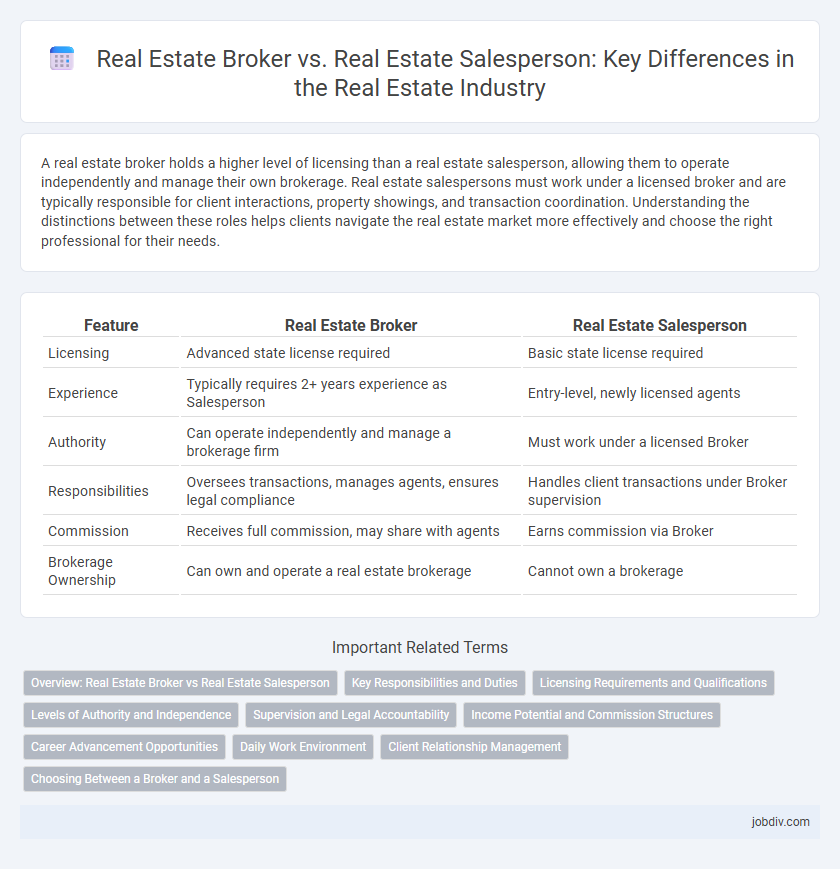A real estate broker holds a higher level of licensing than a real estate salesperson, allowing them to operate independently and manage their own brokerage. Real estate salespersons must work under a licensed broker and are typically responsible for client interactions, property showings, and transaction coordination. Understanding the distinctions between these roles helps clients navigate the real estate market more effectively and choose the right professional for their needs.
Table of Comparison
| Feature | Real Estate Broker | Real Estate Salesperson |
|---|---|---|
| Licensing | Advanced state license required | Basic state license required |
| Experience | Typically requires 2+ years experience as Salesperson | Entry-level, newly licensed agents |
| Authority | Can operate independently and manage a brokerage firm | Must work under a licensed Broker |
| Responsibilities | Oversees transactions, manages agents, ensures legal compliance | Handles client transactions under Broker supervision |
| Commission | Receives full commission, may share with agents | Earns commission via Broker |
| Brokerage Ownership | Can own and operate a real estate brokerage | Cannot own a brokerage |
Overview: Real Estate Broker vs Real Estate Salesperson
A Real Estate Broker holds a higher licensing level than a Real Estate Salesperson and can operate independently, manage a brokerage, and hire agents. Real Estate Salespersons must work under the supervision of a licensed broker and focus primarily on assisting clients with buying, selling, or renting properties. Brokers have additional responsibilities, including overseeing transactions, ensuring regulatory compliance, and often earning higher commissions due to their expanded roles.
Key Responsibilities and Duties
Real estate brokers oversee transactions, manage brokerage firms, and ensure compliance with legal regulations, while real estate salespersons primarily focus on client representation, property showings, and contract negotiations under a broker's supervision. Brokers have the authority to employ agents, handle escrow accounts, and facilitate complex deals, whereas salespersons assist buyers and sellers with market analysis and listing presentations. Both roles require strong interpersonal skills, but brokers hold advanced licenses granting broader operational responsibilities within the real estate industry.
Licensing Requirements and Qualifications
Real estate brokers require advanced licensing that often involves completing more hours of education, passing a comprehensive state exam, and holding a valid real estate salesperson license for a set period. Real estate salespersons must complete basic pre-licensing courses and pass a state licensing exam to practice legally under a broker's supervision. Licensing requirements vary by state but generally involve stringent educational standards and adherence to regulatory guidelines to ensure competence and ethical practice.
Levels of Authority and Independence
A Real Estate Broker holds a higher level of authority and operates independently, able to manage their own real estate firm and supervise salespersons. In contrast, a Real Estate Salesperson must work under the direct supervision of a licensed broker and cannot operate independently. Brokers have the legal responsibility for transactions and compliance, while salespersons execute client dealings under broker oversight.
Supervision and Legal Accountability
Real estate brokers hold a higher level of supervision and legal accountability compared to real estate salespersons, as brokers oversee transactions, ensure compliance with laws, and manage sales teams. Salespersons operate under brokers' licenses and cannot independently handle transactions or regulatory responsibilities. Brokers are legally liable for the actions of their salespersons, making their role critical in maintaining ethical standards and legal adherence in real estate dealings.
Income Potential and Commission Structures
Real estate brokers typically earn higher income potential due to their ability to manage multiple agents and receive a portion of their commissions, whereas real estate salespersons usually earn solely from their own sales commissions. Brokers often have access to higher commission splits and may earn desk fees or override commissions, enhancing overall earnings beyond individual property transactions. Salespersons work under brokers and share a percentage of their commission, which can limit their income compared to brokers who benefit from both personal sales and team commissions.
Career Advancement Opportunities
Real estate brokers have expanded career advancement opportunities compared to real estate salespersons, as brokers can manage their own firms and hire sales agents, increasing their income potential and industry influence. Salespersons typically work under brokers and need to acquire additional licenses and experience to transition into broker roles, which offer leadership responsibilities and higher commission splits. Mastery of negotiation, market analysis, and regulatory compliance further enhances career growth in both positions within the competitive real estate market.
Daily Work Environment
Real estate brokers typically manage office operations, oversee transactions, and provide guidance to salespersons, handling higher-level responsibilities in property deals. Real estate salespersons primarily focus on client interactions, showing properties, and negotiating sales under the supervision of a broker. Both roles require strong communication skills and adaptability, but brokers often engage in administrative tasks and regulatory compliance daily.
Client Relationship Management
Real estate brokers typically oversee client relationship management with greater authority and responsibility, ensuring compliance with legal standards and facilitating complex transactions. Salespersons work under brokers, focusing on building rapport, understanding client needs, and providing personalized service to secure property deals. Effective collaboration between brokers and salespersons enhances client trust and satisfaction throughout the buying or selling process.
Choosing Between a Broker and a Salesperson
Choosing between a real estate broker and a real estate salesperson depends on the level of experience and services required in a property transaction. Brokers typically have advanced licenses allowing them to manage their own firms and oversee salespersons, offering more comprehensive guidance and negotiation skills. Salespersons work under brokers, focusing on client interactions and transaction processes, often providing more direct attention and competitive rates.
Real Estate Broker vs Real Estate Salesperson Infographic

 jobdiv.com
jobdiv.com